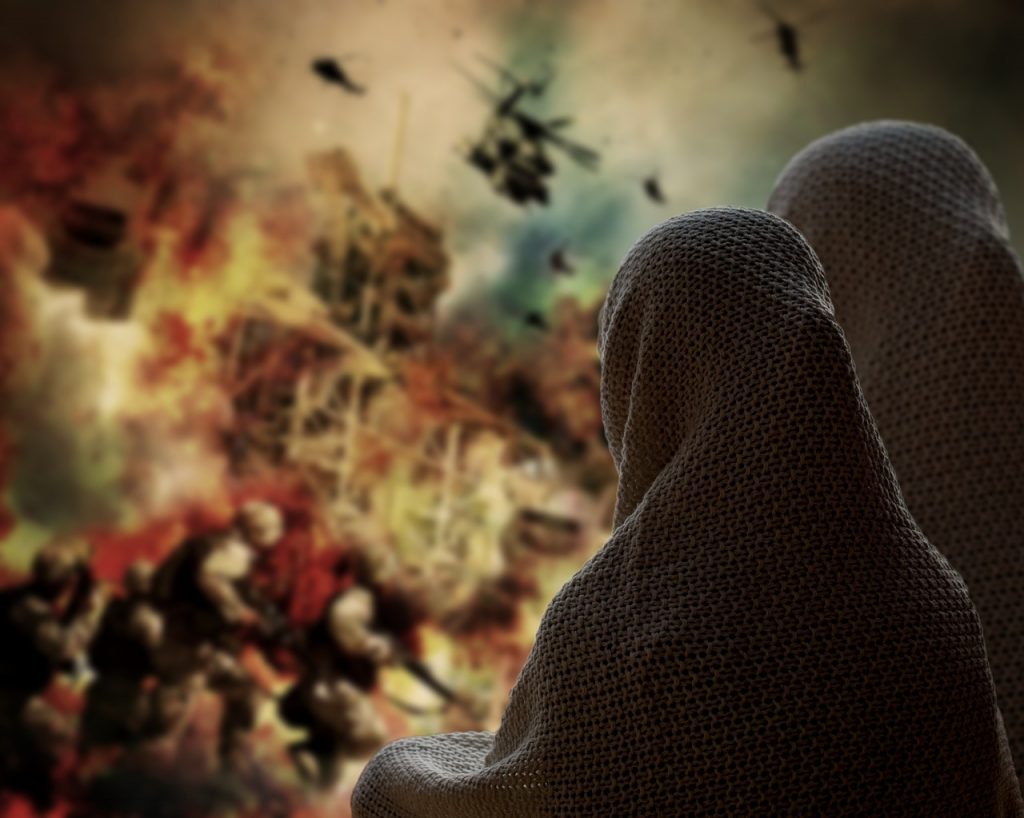
A hand and a remote.
Stubby fingers hover over the buttons hesitantly, wondering which ones to press.
Press number one, and a red-roofed building on a busy street will explode into a cloud of fire and shrapnel. A beggar girl’s skin will peel off her hands and a chaiwallah’s body will be torn into pieces of browned cloth and rubbery flesh. A middle-class engineer’s ears will ring with his daughter’s cries for help and the sharp screech of oblivion that follows after. A mother’s mouth will be stretched into a silent scream as her body splits into a thousand fragments of unseen dreams before her new born son’s eyes.
Press number two, and on a high, craggy mountain cloaked in fog and sky, a man holding a rifle will crouch behind a rock; gasps gushing out of his mouth like the blood gushing out from his wound. A son will watch with blank eyes as his father returns home dressed in the colours of his country and a twelve-year-old girl in a village caught between the teeth of chaos will quake with fear as the other side’s soldiers strip her down, silent prayers embedding themselves into her bare skin.
[Read More: Speaking Out Against Victim-Blaming in Sexual Abuse]
Press number three, and a boy will curl his body into the corner of a wall, tears bleeding onto his cut wrists as he remembers his father’s hands yanking fistfuls of his hair and pushing him out onto the street, spitting the word ‘F*****’ at him, watching as the word coils around his cowering son, strangling the courage crawling up his throat.
Press number four, and a woman in the shower will close her eyes in an effort to numb the sting of the cold water as it digs out the scars on her back and brushes against her husband’s fingers’ imprints on her hips.
Press number five and a family of four will be turned out of their house by a landlord with bundles of banknotes and considerable influence.
Press number six, and a good-for-nothing eighteen-year-old will enter the halls of a prestigious college after showering the Dean in his father’s money, while the boy who topped his class juggles three jobs in an effort to pay the minimum fee for college as well as pay for his father’s medication.
We put this remote in your hands. We slid the batteries into the back of it, supplying you with its power. We trusted you to press the right buttons.
We are your people, and when you press the wrong buttons you dishonor us. We are your people, and when you switch to the channels which entertain you but demean us, you dishonor us.
We are your people, and when you betray our trust, you dishonor us. We are your people, and when you don’t keep your promises, you dishonor us.
Our pleas are whispers which you do not seem to hear, but ignore us and we will make you listen, as we shout for justice.
[Read More: Speaking Out Against Victim-Blaming in Sexual Abuse]
 Nidhi Krishna is a sixteen-year-old from Pune who has just recently completed her ICSE board exams from St. Mary’s School and is now pursuing her eleventh grade in the humanities stream from Delhi Public School, Pune. When she’s not procrastinating, she can be found devouring a large number of books. She also loves dogs and dark chocolate, and knows the lyrics to a large number of Disney songs. You can follow her on her blog here.
Nidhi Krishna is a sixteen-year-old from Pune who has just recently completed her ICSE board exams from St. Mary’s School and is now pursuing her eleventh grade in the humanities stream from Delhi Public School, Pune. When she’s not procrastinating, she can be found devouring a large number of books. She also loves dogs and dark chocolate, and knows the lyrics to a large number of Disney songs. You can follow her on her blog here.




